#cultural anthropology
Text
I love you people going into "useless" fields I love you classics majors I love you cultural studies majors I love you comparative literature majors I love you film studies majors I love you near eastern religions majors I love you Greek, Latin, and Hebrew majors I love you ethnic studies I love you people going into any and all small field that isn't considered lucrative in our rotting capitalist society please never stop keeping the sacred flame of knowledge for the sake of knowledge and understanding humanity and not merely for the sake of money alive
#classics#mythology#ancient greek mythology#ancient roman mythology#comparative literature#latin#hebrew#ethnic studies#fuck capitalism#communism#i love my useless degree idc#academia#university#dark academia#Greek#philosophy#liberal arts#humanities#women and gender studies#cultural anthropology
35K notes
·
View notes
Text



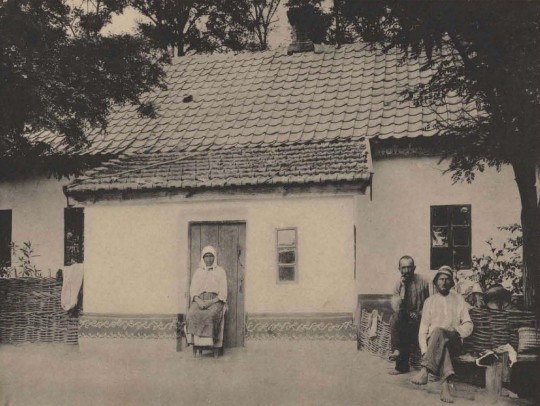
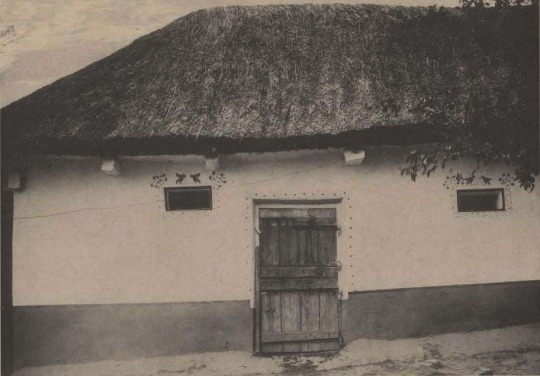
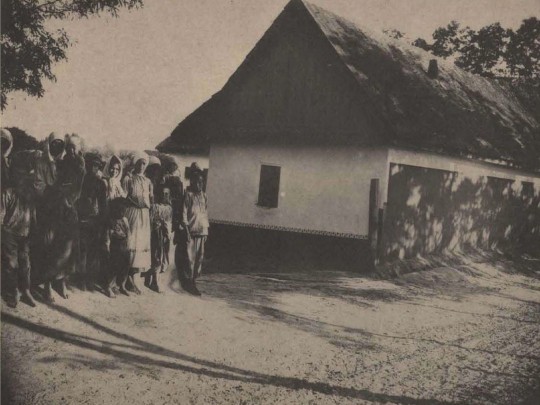

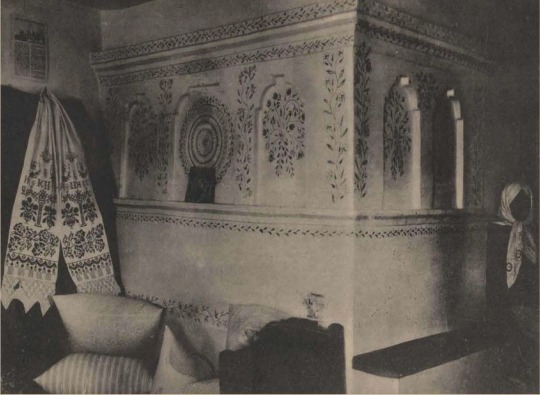
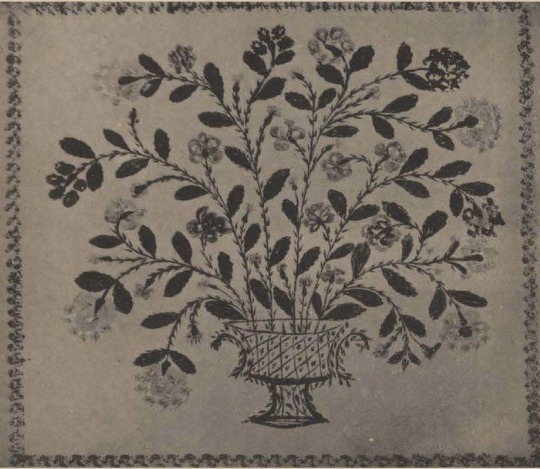

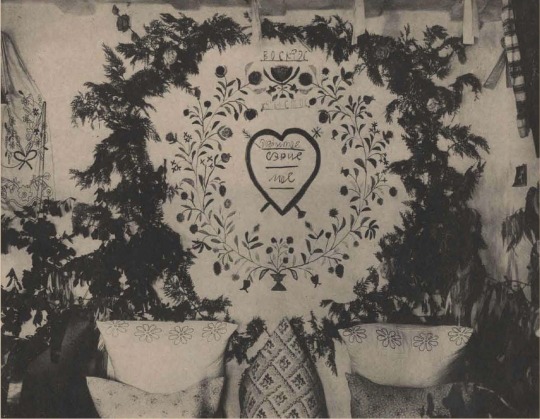
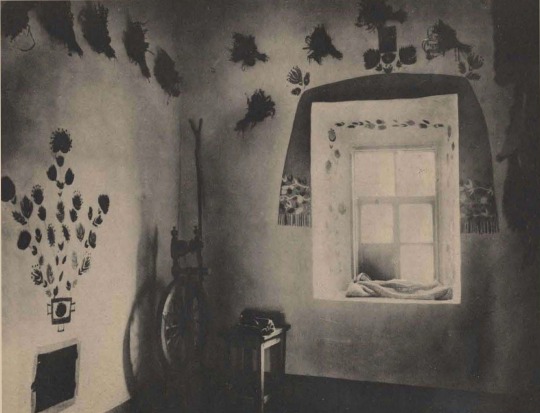


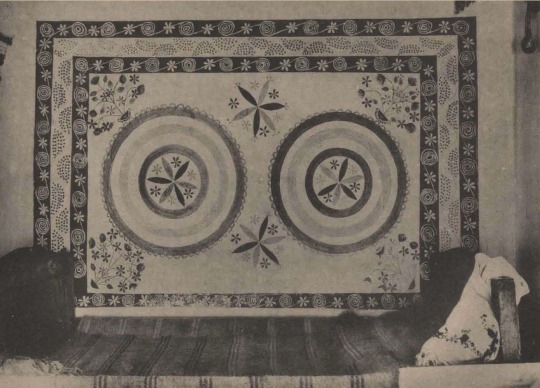

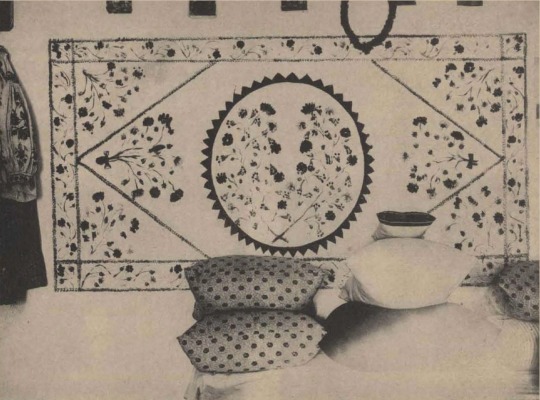



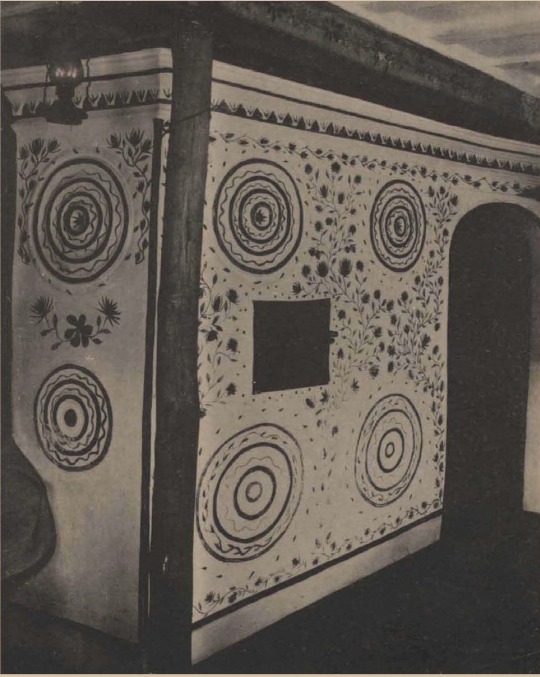
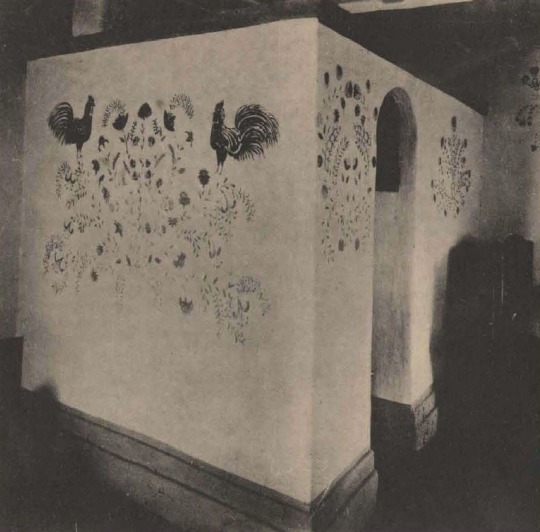








Wall and fireplace paintings in interior and exterior design of Ukrainian rural cottages from Dnipro, Kryvyi Rih and Kremenchuk areas, 1924-1928.
The book (where the main text is ukrainian, but attribution of photos you may see also in German) is here : https://uartlib.org/istoriya-ukrayinskogo-mistetstva/yevgeniya-berchenko-nastinne-malyuvannya-ukrayinskih-hat-ta-gospodarskih-budivel-pri-nih-dnipropetrovshhina/
#culture#world culture#traditional culture#interiors#cottage aesthetic#cottagestyle#retro#photography#vintage#ukraine#eastern europe#wall decor#wall drawing#home decor#ukrainian#cultural anthropology#ethnography#ethnology#folk culture#folk style#український tumblr#art#architecture
351 notes
·
View notes
Text
The freedom to abandon one’s community, knowing one will be welcomed in faraway lands; the freedom to shift back and forth between social structures, depending on the time of year; the freedom to disobey authorities without consequence – all appear to have been simply assumed among our distant ancestors, even if most people find them barely conceivable today. Humans may not have begun their history in a state of primordial innocence, but they do appear to have begun it with a self-conscious aversion to being told what to do. If this is so, we can at least refine our initial question: the real puzzle is not when chiefs, or even kings and queens, first appeared, but rather when it was no longer possible simply to laugh them out of court.
The Dawn of Everything: A New History of Humanity by David Graeber and David Wengrow
#the dawn of everything#David Graeber#David Wengrow#archeology#prehistory#anthropology#history#upper paleolithic#paleolithic#human history#sociology#book recommendations#book quotes#nonfiction#readings#reading list#reading recommendations#book rec#cultural anthropology#history of science#inequality#anarchism#writings
1K notes
·
View notes
Text
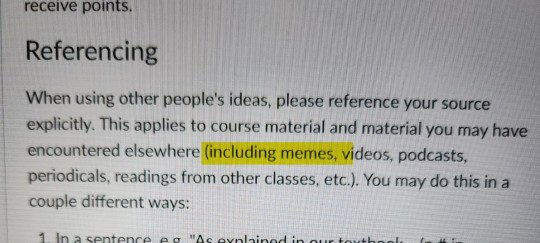
I can cite memes in my cultural anthropology class
177 notes
·
View notes
Text
I'm curious about cultural differences around kids calling adults by their first name with no title. My family is Jewish and we always did that, and it seemed the norm among my friends. Is that a particularly Jewish norm?
You define for yourself whether you're Jewish. I didn't grow up with any religious practice, but still feel culturally Jewish.
(In this I'm not counting teachers or other adults where school/other rules applied.)
This ignores a lot of things like age and country, and flattens the wide variety of non-Jewish cultures into one group, but all of that wouldn't fit into a tumblr poll so I'm simplifying it.
(There probably is actual information on this somewhere out there if I looked, but it's more fun to do a completely non-representative tumblr poll.)
#cultural norms#cultural anthropology#jumblr#jewblr#jewish culture#jewish life#judaism#jewish#tumblr polls#my polls#shower thoughts that become polls
416 notes
·
View notes
Text

Hey friends, Benjamin Maldonaldo reached out to us on Instagram and asked us to share his post about a SOLARPUNK SURVEY which is super awesome!! He wants to take the temperature of what solarpunks are thinking/feeling about solarpunk itself as a movement/genre for his bachelor's thesis, and we think it's a rad concept. Here's the link:
"Dear Solarpunks, my name is Benjamín Maldonado, a Chilean 21 year old Solarpunk enthusiast that throughout the last few months, has tried to learn as much as possible about the movement and genre. This personal passion led me to choose Solarpunk as the subject of my thesis for the Bachelor of Cultural Anthropology at Leiden University.
The following survey will be part of that thesis, where I will ask you about your thoughts on different matters like the Solarpunk movement, Solarpunk content, Solarpunk communities and some basic demographics. Based on the time I have spent in Solarpunk forums, it is very likely that you are also curious on what other Solarpunks think. Given this, after I close the survey I would like to share my findings with you all, hopefully contributing to the ongoing debates within the community.
Your participation in this survey is entirely voluntary, and all responses will be kept confidential. Your personal information will not be divulged, and your individual responses will remain anonymous. The data gathered from this survey will be used solely for research purposes related to this research, supervised by Assistant Professor Rodrigo Ochigame and Assistant Professor John Boy
Although I am sure there are a lot of underage Solarpunks who have a lot to say, I sadly will not be allowing people younger than 18. This is solely a legal matter. Your understanding and cooperation on this matter are greatly appreciated."
95 notes
·
View notes
Text
I know this is an art blog but my anthropology brain is taking over and I NEED TO TALK ABOUT THIS.
I was watching Gorilla videos, as I do every morning. Today’s video of the Shabani family in Higashiyama zoo showed an interesting interaction between Kiyomasa (a teenage male gorilla) and his mother, Nene. Here is the clip:
Nene wanted the tomato, but Kiyomasa ate it first. She kept staring at him... and then he patted her back. It's like he's telling her "alright ma. you'll get it next time"
Some people might find that as projecting human emotions, but hear me out...
I used to believe that I always projected human thoughts and emotions when I interpret animal behaviour in a certain way. But I've come to believe it's not the case. In one of my anthropology classes, there was a passage from a "Aesop's Anthropology" by John Hartigan about anthropocentric tendencies we have and that we think only humans are capable of thinking and feeling. So much so that when we see animals acting in a way that feels humanly familiar, it's not that we are projecting our human condition on them, but merely the fact that their behaviour is EXACTLY what we see.
Here is the passage:

It's only one sentence. I don't know if the author ever goes into this topic again, since this is from the introduction, and that's all we've read of it in class (we read several chapters from different books every week to get a variety of views). I'm really interested in reading more about it. I'll get the whole book one day...
Anyways, this sentence left such a profound effect on me. I made it the core of my seminar discussion the next class.
Please share any thoughts, reflections, or insights you have on this topic! I'd love to hear!
202 notes
·
View notes
Text
In case anyone was wondering what anthropologists do -
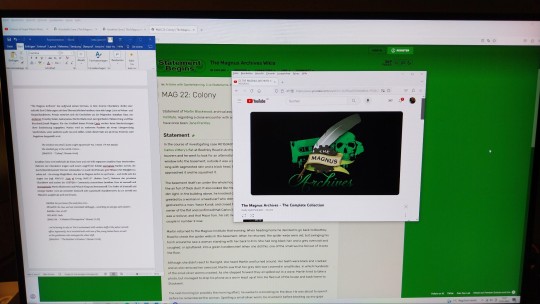
#cultural anthropology#anthropology#media analysis#bachelor thesis#the magnus archives#tma#jonathan sims#*insert pidgeon meme here* is this Science?
61 notes
·
View notes
Text

#anthropology#cultural anthropology#class war#classwar#ausgov#politas#auspol#tasgov#taspol#australia#neoliberal capitalism#fuck neoliberals#anthony albanese#albanese government#fuck the gop#fuck the police#fuck the supreme court#fuck the patriarchy#anti capitalism#capitalism#anti capitalist#capitalist hell#capitalist dystopia#capitalist bullshit#eat the rich#eat the fucking rich#fuck the system#capitalist system#antiauthoritarian#antinazi
135 notes
·
View notes
Text
I think Midsommar is now one of my favourite horror movies, especially because I spent half the movie either relating to or criticising the anthopologist characters.
I was like, "Oh! Ritual gerontocide! That's interesting, write about it in your field diaries. He is writing about it in his field diary! Great", "You rat", "You can both study the community without fucking each other over, don't be childish", "You peed where?! Did you get your degree in a raffle????", "DON'T DO THAT, YOU WILL LOSE THE ELDERS' TRUST AND DESTROY YOU INVESTIGATION... Oh, he got killed. Not surprised.", "Oh no. He asked about incest taboos... He is not leaving that conversation for the rest of the day. I mean, it's a good question, it's one of the most important questions. But he is going to spend hours there", "The symbolism here is amazing", "Keeping a ritual alive with such a long in between period is HARD cultural work".
I had so much fun. I love it.
#midsommar#cultural anthropology#I love my best friend they listened to aaaaaall that commentary#horror movies#florence pugh
59 notes
·
View notes
Note
Sorry if this is an inappropriate or rude question, you don’t have to answer.
I’ve been dealing with internalised negative feelings about religion, due to being raised by very Christian family, when I’ve never believed what they said. It made me think that religion is an awful thing, a cult by sorts.
A few years back, I made a friend who is Jewish and he’s really cool and I respect him a lot. I also am trying my hardest to respect that he is religious but I can’t help that voice in my head, saying he’s corrupted.
I don’t think I believe it anymore but I kind of want to ask, a reassurance I guess, what your views are in religion as a whole? Why do you believe it’s good?
First of all, it is not marginalized people's jobs to prove to why they deserve humanity. If you had asked any other Jew this question, they would have every right to ignore this quesiton and/or call you out on it.
However, I do put myself out there and try to educate people, so I'll answer your question.
Religion is part of human culture and history. For as long as humans have been humans, we've always had symbolic representation, taboos, and imagination. Paleolithic humans burying their dead with body paint and bead ornamentation- that's an example of spiritual belief. To be human is to be illogical, superstitious, and imaginative. Even other animals can sometimes act according to superstition or seemingly illogical motives. Humans are incredibley intelligent, and with our intelligence comes questions we cannot answer and fears we cannot explain. Where are we from? What is death? Where are we going? What is our purpose? These are all answers we seek, and having a religious belief set can help answer these questions. Religion is just a world view in the same way Western science is a world view, and they're not incompatible with each other. Many scientists are religious, I myself am a student of science and am religious.
Religion has brought people together for all of human history- it allows the sharing of ideas and resources. Harvest festivals, weddings, coming-of-age ceremonies, funerals, all these religious events serve to reinforce the bonds in a community. A relationship must be maintained and reinforced, or it becomes stagnant. Having a shared spiritual belief system and coming together for ceremonies reignites communal bonds. Religion also allows for a community to have a shared moral system. While religion isn't necessary for morality, it definately helps define the values and morals of a person and community. If a community can come together and agree on a system of values, then there's less potential for violence due to incompatible values. Religion is a social contract. Religion is also a comfort, and can help with the immense wait of loneliness we face. If the trees and water have spirits, then you are not alone. If your loved one goes to an afterlife after death, then they are not alone.
Religion has as much potential for harm as any world view. Just as there have been countless atrocities committed in the name of religion, so too have there been countless atrocities committted in the name of science. Does that mean we should just toss out all of science? No. In the same way we shouldn't get rid of religion.
Additionally, "Religion" isn't a monolith. It's not one world view, but a category of world views. There are many forms of religion and each religion is different. Monotheism, polytheism, animism, ancestor veneration, etc- these are all different kinds of religion that can overlap with eachother too. A bad experience with one religion doesn't define all religions. With all due respect, your experience is anecdotal, and you can't apply your singular lived experience to every since religion in the world.
And for Jews, our religious identity is deeply important to us. We've been persecuted for thousands of years for our identities, and we've miraculously not disappeared from the face of the earth. You don't have to understand why your friend is religious, but you need to unpack why you think he's corrupted and why you think you have the right to apply your experience with religion to every religious person. The fact that you were raised Christian might be another contributing factor to your bias towards your friend- antisemitism is often deeply ingrained in aspects of Christianity.
#religion#anthropology#culture#human history#human behaviour#animal behavior#superstition#human condition#cultural anthropology#antisemitism
261 notes
·
View notes
Text
hey guys this is kind of weird but i have a question
im majoring in Anthropology (B.A.) and im in my first year but i’m second guessing my major already bc i don’t know what i can do with my degree? if you have a major or even minor in anything anthropology related plz send me an ask or dm with advice lol. ik it’s still far in the future but i’m scared for my future if i can’t get a job in this field?? and also, i chose this major bc it seemed really cool and interesting bc of my history obsession but also just my interest in humanity as a whole but now idk if that was the right choice to do while picking a major
maybe i should’ve followed in my parents footsteps and gone in the medical field
#anthropology#please help#anthropology major#archeaology#cultural anthropology#biological anthropology#linguistic anthropology
64 notes
·
View notes
Text
Fall sem starts in 2 days! Heres my schedule
Intro to Ethnomusicology (Intermediate Seminar) - MWF / 8-8:50am
Dinosaurs: A Natural History - MWF / 9-9:50am
Intro to Biological Anthropology - MWF / 10-10:50am
Intro to Cultural Anthropology - MWF / 11-11:50am
[ LUNCH BREAK ]
Intro to Archaeology - MW / 1-2:15pm
currently can’t get my textbooks because of an issue w financial aid that will hopefully be resolved in the morning. super nervous bc new school and lots of work ahead but also excited for my new major/program and hopefully making more friends :)
#studyblr#langblr#study blog#language learning#langblog#studyinspo#study notes#study aesthetic#study motivation#studyspo#study#anthropology#archaeology#archaeoblr#anthro#cultural anthropology#biological anthropology#dinosaurs#paleontology#paleoblr#paleoanthropology
51 notes
·
View notes
Note
Inspired by your recent post, what exactly was the social status of jesters? Like you said that motley signified fools being allowed to stand outside society? I always assumed that the Fool and Jester represented the lower classes or signified that. Where did jesters fall in the social structure of that time?
There is a concept in anthropology called "licensed misrule," that's associated with Carnival/Mardi Gras/etc. in which the establishment of medieval society - the monarchical state and the Catholic Church - allowed for a period in which the rules and norms were temporarily suspended, the social hierarchy was inverted with the lowly wearing crowns and miters and appointed "kings for a day," and all kinds of bawdy and irreverant satire was allowed to be uttered without penalty.
The idea was that these kind of rituals offered a kind of "safety valve" for social tensions, and thus counter-intuitively reinforced the stabillity of the establishment by giving the lower orders a chance to harmlessly blow off steam without materially challenging the distribution of power.

The jester is kind of like that, a figure of "licensed misrule." As I said earlier, their "motley" was a deliberate mockery of the sumptuary laws regulating which social classes could wear which kinds of clothing. They also wore distinctive caps that mixed the appearance of royal crowns or monks' cowls with that of animals and carried a sceptre in mockery of the king's.
When it came to their work, the jester was allowed to make fun of the king and the nobility and the church without punishment - the so-called "jester's privilege" - again, another sign that they are outside the law. At the end of the day, though, a jester is just an entertainer who's there to make people laugh and show that the king and his court have a sense of humor about themselves.
And that's what I mean by them being outside the social structure: the motley, the props, the privilege is all a strange mixing of lower class and upper class. This impossible fusion is both a signal of their unique status but also part of the joke, the same kind of inversion of hierarchy we see with Carnival.
92 notes
·
View notes
Text
OKEY BUT
I'm studying cultural anthropology for 5 years now and OFMD2 showed how important is to understand cultural context in process to understanding people around us. This is exacly what my professors are trying to explain - if someone believes that smth is real even tho we don't belive it, it is real because the reactions and later effects are real.
I will literally send this scene to my class

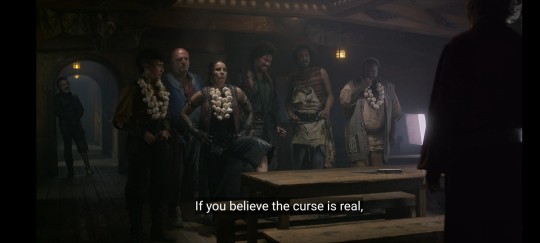


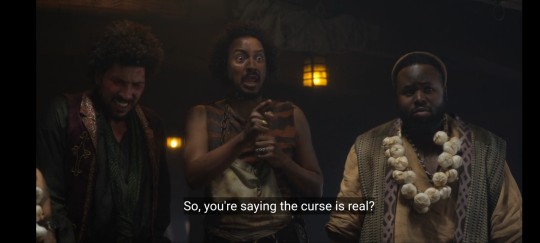
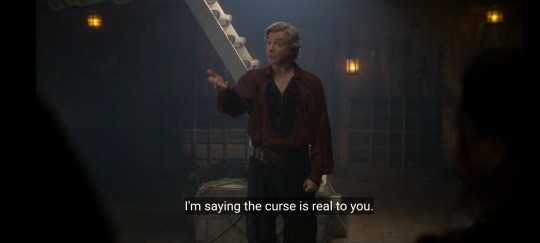
#i just love this show#our flag means death#our flag means death season 2#ofmd spoilers#cultural anthropology
32 notes
·
View notes
Text
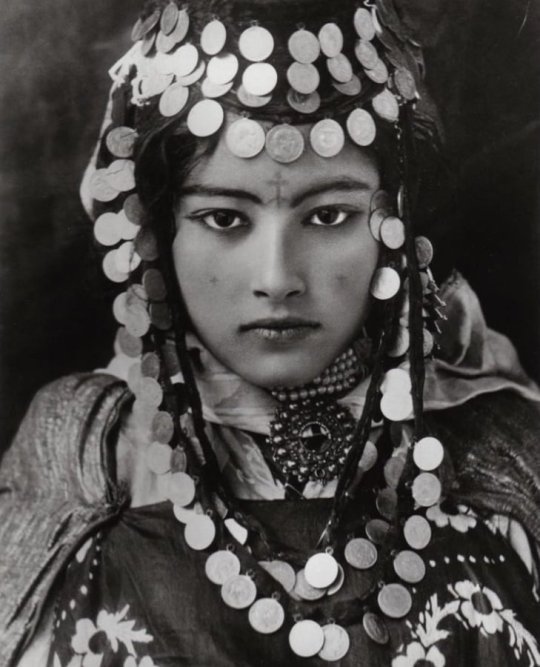
A young woman from the Ouled Nail (pronounced "willed nah-eel") tribe in Algeria, 1905. On the forehead of the Nailiyat shown in the photo above is the yaz symbol, which is also the letter Z in the Amazigh alphabet. The symbol also represents the Imazighen and can be found on their flag.

The Berber ethnic flag - The Imazighen are a diverse grouping of distinct ethnic groups indigenous to North Africa who predate the arrival of Arabs in the Arab migrations to the Maghreb. Their main connections are identified by their usage of Berber languages
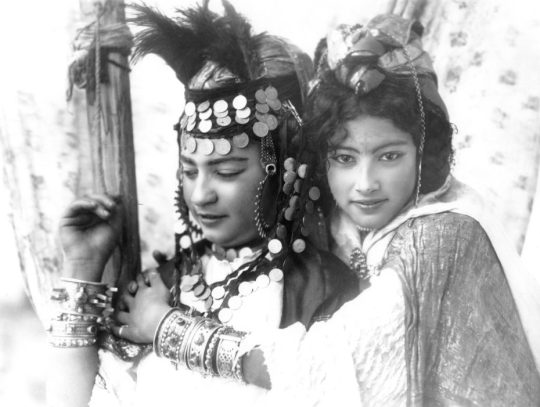
The Ouled Nail origins are shrouded in mystery but some time in the 7th and 8th century, they converted to Islam along with the other Imazighen in North Africa. What distinguished the Ouled Nail from the other tribes was the status of their women (Nailiyat) who were financially independent from the men. They worked as dancers and sex workers in neighboring towns and cities and would be accompanied by the older Nailiyats.

While this line of work was quite common amongst the Nailiyats as it was steeped in tradition, dating back thousands of years, it was not forced or even expected of them; it was simply one practical avenue of accumulating capital.
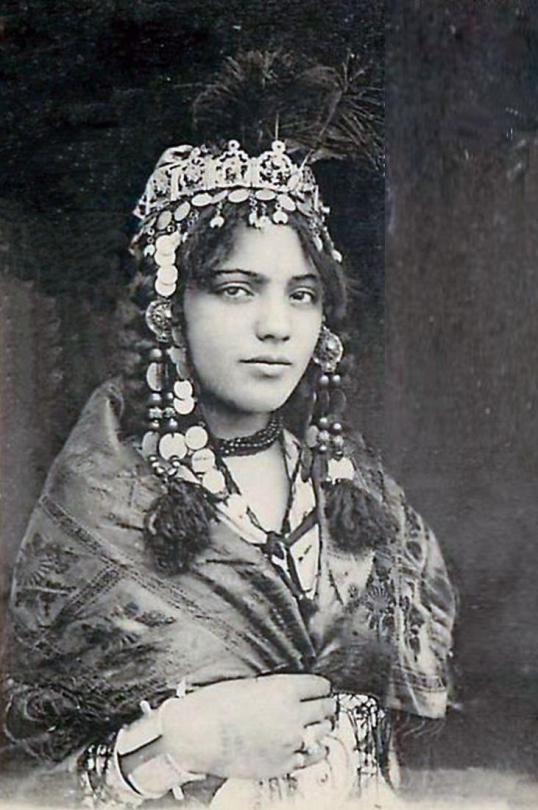
The Nailiyats would work anywhere from 5 to 15 years and use the money that they earned to purchase property, after which, they would seek suitors in hopes of settling down.
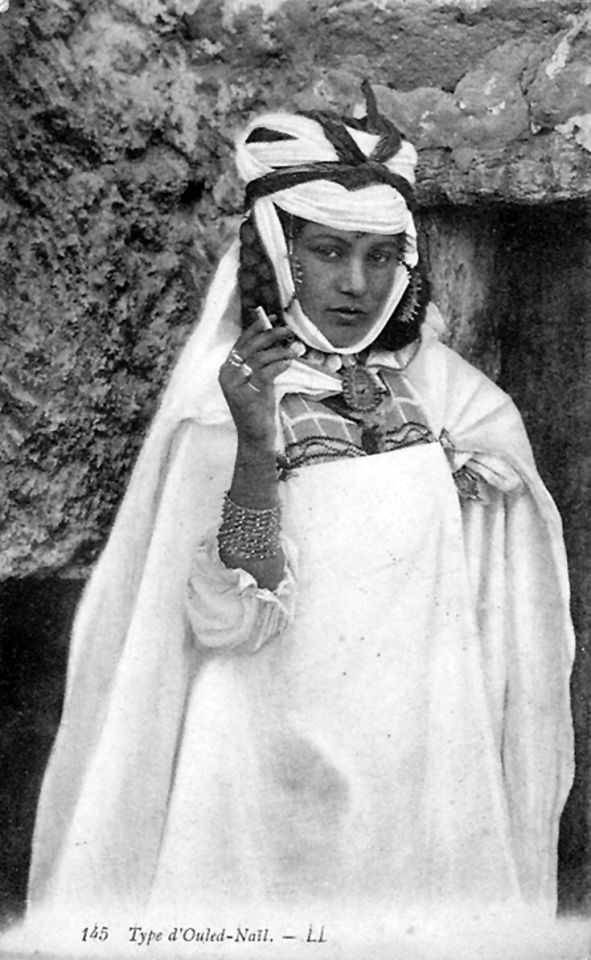
The Arabs found themselves captivated by these dancers adorned in flowing robes and adorned with sparkling jewellery. In fact, the name "Bou Saada," the city closely associated with the Nailiyat, translates to "Place of Happiness" in Arabic, a direct nod to their influence.
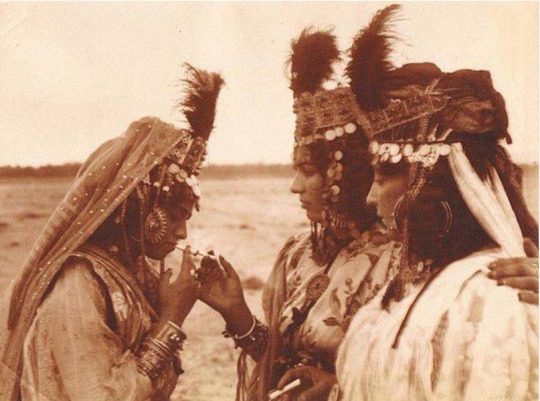
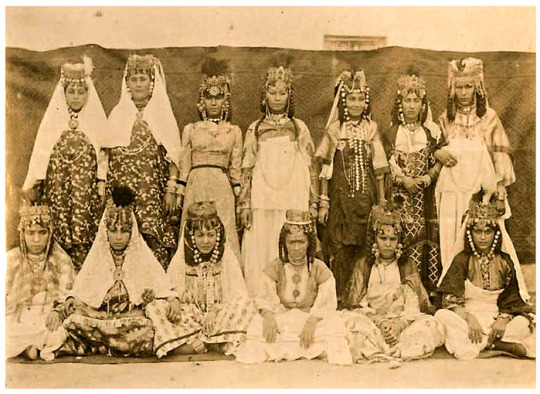
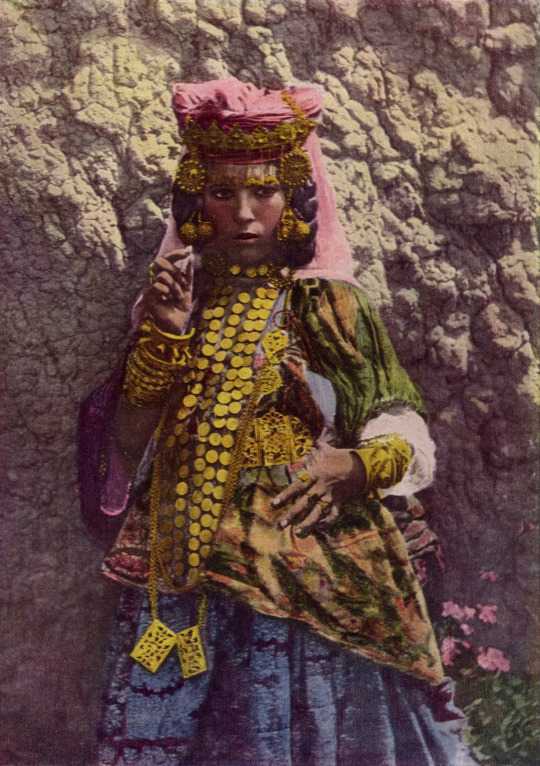
Ouled Naïl woman in the complex traditional costume

As European colonization commenced in 1830, Europeans also became enamoured with the Ouled Nail's countless charms. Suddenly, salons across the Continent were filled with Orientalist paintings, as well as photographs and postcards depicting enchanting women bedecked in coins.

Ouled Nail elongated adorned, 19th century

Ouled nail dancing
#art#paintings#photography#culture#imazighen#berber#amazigh#north africa#Ouled nail#cliff clavin#traditions#traditional clothing#costumes#customs#cultural anthropology#Nailiyats
19 notes
·
View notes